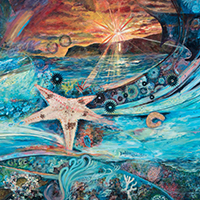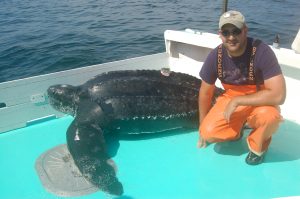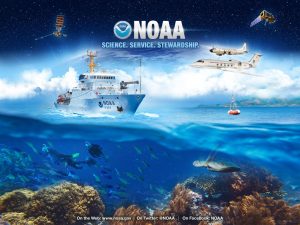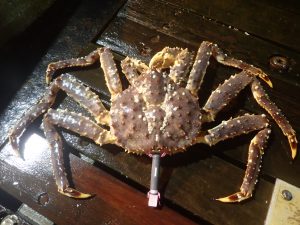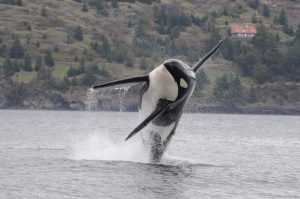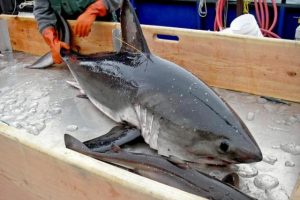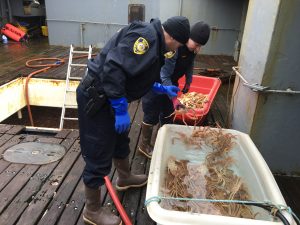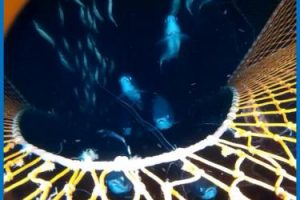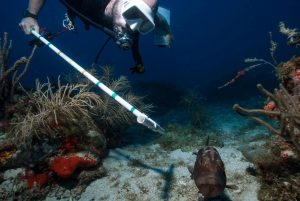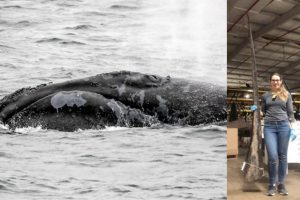Born is the Coral Polyp, A Creation Story from Hawai’i
Malia K. Evans, NOAA’s Papahānaumokuākea Marine National Monument in Wai’anae, Hawai’i Emerging from the deep darkness was the tiny coral polyp, the first life form born in the Kumulipo, a Hawaiian creation story. The 2,100 line chant establishes and reaffirms the family relationships Native Hawaiians maintain to the natural environment, to each other and to our…
Read MoreTurning Up the Heat: Fish and sea turtles in a warming world
Vincent Saba, NOAA’s Northeast Fisheries Science Center in Woods Hole, MA and NOAA’s Geophysical Fluid Dynamics Laboratory at Princeton University in Princeton, NJ From microscopic plants to large whales, climate change is affecting all ocean life. There are many ways in which climate change can affect ocean ecosystems but during this webinar, we will investigate the effects of…
Read MoreHelp from above – using planes, drones, and satellites to study and protect plants and animals **Smithsonian National Air and Space Museum NOAA Family Day**
NOAA Live! All Stars: Katie Sweeney, NOAA’s Alaska Fisheries Science Center in Seattle, WA Allison Henry, NOAA’s Northeast Fisheries Science Center in Woods Hole, MA Brandon Krumwiede, NOAA’s Office for Coastal Management in Duluth, MN Jennifer Stock, NOAA’s Cordell Bank National Marine Sanctuary in Point Reyes, CA In partnership with the Smithsonian National Air and Space Museum. This…
Read MoreThe Crab-tivating Life of Crustaceans: Where do they go? How do they grow? What do we know?
Erin Fedewa and Leah Zacher, NOAA Fisheries Alaska Fisheries Science Center’s Kodiak Laboratory in Kodiak, AK How much do you know about Alaskan crab? Join us as we learn to identify crustaceans found in Alaskan waters and talk about crab biology with live appearances from some “crabby” guests. We’ll even find out how to tag…
Read MoreKiller Whale Tales: Environmental Science through Storytelling
Lynne Barre, NOAA Fisheries West Coast Regional Office and Jeff Hogan, Killer Whale Tales in Seattle, WA How can you help recover endangered orcas? Join Lynne Barre, NOAA’s Recovery Coordinator for endangered killer whales, and Jeff Hogan, Executive Director of Killer Whale Tales, to learn about the Southern Resident population of killer whales, the challenges…
Read MoreNorth to the Future: Alaskan sharks in a changing ocean
Cindy Tribuzio, NOAA Fisheries Alaska Fisheries Science Center in Juneau, AK, and Sabrina Garcia, Alaska Department of Fish and Game in Anchorage, AK Scientists at the Alaska Fisheries Science Center conduct research and assess the stocks of many species of sharks in Alaskan waters. Join us for a discussion of the different sharks found in…
Read MoreFishy Business: NOAA Office of Law Enforcement and Healthy Resource Management
Alex Perry, Wynn Carney, and Amy Anderson, NOAA Office of Law Enforcement in Anchorage, AK Have you ever wondered what would happen to our animal populations without managing their harvest? How do we keep our fisheries and marine mammal populations healthy, and make sure that we manage our marine resources so that we have enough…
Read MoreOne Fish, Two Fish, This Fish, Not That Fish
Noelle Yochum, NOAA Fisheries Alaska Fisheries Science Center in Seattle, WA, and Michelle Dyroy, Alaska Pacific University in Anchorage, AK Do you want to be an honorary Conservation Engineer? Don’t know what that is? Come find out! Learn about exciting research on how fish behave inside fishing gear and how we can improve our fisheries.…
Read MoreFin-tastic Fun with Coral Reef Fish Surveys in South Florida and the Caribbean
Erin Cain and Jay Grove, NOAA’s Southeast Fisheries Science Center in Key Biscayne, FL Take a dive with us into coral reef fish communities and learn all about how we identify, survey, and help inform managers about reef fish populations through NOAA’s National Coral Reef Monitoring Program (NCRMP). Using engaging, interactive photos and videos, we…
Read MoreNeedle in a haystack: Studying the world’s rarest large whale
Dana Wright, University of Washington, Cooperative Institute for Climate, Ocean, and Ecosystem Studies (CICOES) and Duke University Marine Laboratory, working with NOAA Fisheries Alaska Fisheries Science Center in Seattle, WA How does one study the rarest whale on earth in one of the most remote places in the ocean? Come learn how scientists use a…
Read More
